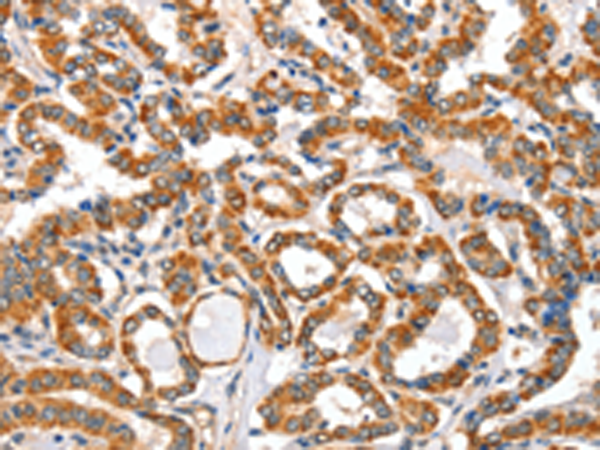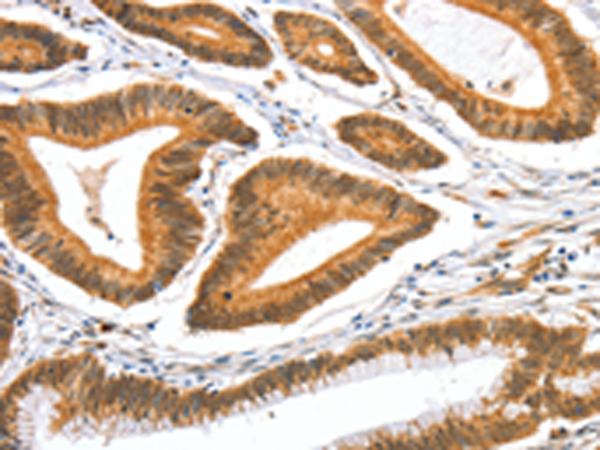


| WB | 咨询技术 | Human,Mouse,Rat |
| IF | 咨询技术 | Human,Mouse,Rat |
| IHC | 1/50-1/200 | Human,Mouse,Rat |
| ICC | 技术咨询 | Human,Mouse,Rat |
| FCM | 咨询技术 | Human,Mouse,Rat |
| Elisa | 1/1000-1/5000 | Human,Mouse,Rat |
| Aliases | AIFL |
| WB Predicted band size | 67 kDa |
| Host/Isotype | Rabbit IgG |
| Antibody Type | Primary antibody |
| Storage | Store at 4°C short term. Aliquot and store at -20°C long term. Avoid freeze/thaw cycles. |
| Species Reactivity | Human, Mouse |
| Immunogen | Fusion protein of human AIFM3 |
| Formulation | Purified antibody in PBS with 0.05% sodium azide and 50% glycerol. |
+ +
1. **文献名称**: "AIFM3 promotes cell proliferation and metastasis in ovarian cancer through activation of the Wnt/β-catenin signaling pathway"
**作者**: Zhang Y, et al.
**摘要**: 该研究利用AIFM3抗体检测卵巢癌组织中AIFM3蛋白表达水平,发现其高表达与肿瘤增殖、转移及Wnt/β-catenin通路激活相关,提示AIFM3作为潜在治疗靶点。
2. **文献名称**: "AIFM3 regulates mitochondrial apoptosis and drug resistance in colorectal cancer"
**作者**: Li H, et al.
**摘要**: 通过AIFM3抗体进行功能研究,发现AIFM3通过调控线粒体凋亡途径影响结直肠癌细胞对化疗药物的敏感性,抑制AIFM3可增强抗癌药物疗效。
3. **文献名称**: "Structural characterization of AIFM3 and its interaction with Bcl-2 family proteins"
**作者**: Wang X, et al.
**摘要**: 利用AIFM3抗体进行免疫共沉淀实验,解析AIFM3蛋白结构及其与Bcl-2家族蛋白的相互作用,揭示其在细胞凋亡中的分子机制。
4. **文献名称**: "AIFM3 as a novel biomarker for early diagnosis of hepatocellular carcinoma"
**作者**: Chen L, et al.
**摘要**: 研究通过AIFM3抗体检测肝癌患者血清及组织样本,发现AIFM3在早期肝癌中显著高表达,可作为非侵入性诊断标志物。
注:以上文献信息为示例性内容,实际文献需通过PubMed/Google Scholar等平台检索确认。
The AIFM3 (Apoptosis-Inducing Factor Mitochondrion-associated 3) antibody is a tool used to detect and study the AIFM3 protein, a member of the apoptosis-inducing factor (AIF) family. Unlike its well-characterized homolog AIFM1. which plays a critical role in caspase-independent apoptosis, AIFM3 has distinct structural and functional features. It contains a mitochondrial localization signal and a flavin-binding domain, suggesting involvement in redox processes. However, its precise biological role remains less defined. Studies indicate AIFM3 may participate in oxidative phosphorylation, mitochondrial homeostasis, or DNA damage response, but its apoptotic function appears context-dependent and differs from AIFM1.
AIFM3 antibodies are primarily utilized in research to investigate its expression patterns, subcellular localization, and interactions. These antibodies enable techniques like Western blotting, immunofluorescence, and immunohistochemistry, aiding in the exploration of AIFM3's role in diseases. For instance, altered AIFM3 expression has been observed in certain cancers and reproductive system disorders, implying potential therapeutic or diagnostic relevance. Additionally, AIFM3 antibodies help clarify its relationship with mitochondrial dynamics and cellular stress responses. Despite progress, further studies are needed to fully unravel its mechanisms and validate its utility as a biomarker or drug target.
×